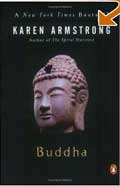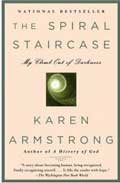
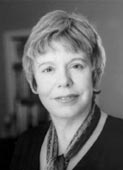 Karen Armstrong is one of the foremost commentators on religious affairs in both Britain and the United States. She spent seven years as a Roman Catholic nun, took a degree at Oxford University, teaches at Leo Baeck College for the Study of Judaism, and received the 1999 Muslim Public Affairs Council Media Award.
Karen Armstrong is one of the foremost commentators on religious affairs in both Britain and the United States. She spent seven years as a Roman Catholic nun, took a degree at Oxford University, teaches at Leo Baeck College for the Study of Judaism, and received the 1999 Muslim Public Affairs Council Media Award. Her previous books include the best-selling A History of God: The 4000-Year Quest of Judaism, Christianity, and Islam; Jerusalem: One City, Three Faiths; and In the Beginning: A New Interpretation of Genesis.... author of numerous books on religious affairs, including A History of God, Through the Narrow Gate, Holy War, Islam, and Buddha. Her work has been translated into forty languages. She is also the author of three television documentaries and took part in Bill Moyers's television series Genesis. Since September 11, 2001, she has been a frequent contributor to conferences, panels, newspapers, periodicals, and throughout the media on both sides of the Atlantic on the subject of Islam. She lives in London.
For More Bio See: http://en.wikipedia.org/wiki/Karen_Armstrong
|
Book Description Armstrong traces the development of the Axial Age chronologically, examining the contributions of such figures as the Buddha, Socrates, Confucius, Jeremiah, Ezekiel, the mystics of the Upanishads, Mencius, and Euripides. All of the Axial Age faiths began in principled and visceral recoil from the unprecedented violence of their time. Despite some differences of emphasis, there was a remarkable consensus in their call for an abandonment of selfishness and a spirituality of compassion. With regard to dealing with fear, despair, hatred, rage, and violence, the Axial sages gave their people and give us, Armstrong says, two important pieces of advice: first there must be personal responsibility and self-criticism, and it must be followed by practical, effective action. In her introduction and concluding chapter, Armstrong urges us to consider how these spiritualities challenge the way we are religious today. In our various institutions, we sometimes seem to be attempting to create exactly the kind of religion that Axial sages and prophets had hoped to eliminate. We often equate faith with doctrinal conformity, but the traditions of the Axial Age were not about dogma. All insisted on the primacy of compassion even in the midst of suffering. In each Axial Age case, a disciplined revulsion from violence and hatred proved to be the major catalyst of spiritual change. |
|
|
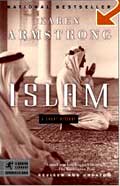
Islam : A Short History (Modern Library Chronicles) (Paperback) by Karen Armstrong
"During the month of Ramadan in 610 C.E., an Arab business man had an experience that changed the history of the world..." (more)
Amazon.com
The picture of Islam as a violent, backward, and insular tradition should be laid to rest, says Karen Armstrong, bestselling author of Muhammad and A History of God. Delving deep into Islamic history, Armstrong sketches the arc of a story that begins with the stirring of revelation in an Arab businessman named Muhammad. His concern with the poor who were being left behind in the blush of his society's new prosperity sets the tone for the tale of a culture that values community as a manifestation of God. Muhammad's ideas catch fire, quickly blossoming into a political empire. As the empire expands and the once fractured Arabs subdue and overtake the vast Persian domain, the story of a community becomes a panoramic drama. With great dexterity, Armstrong narrates the Sunni-Shi'ite schism, the rise of Persian influence, the clashes with Western crusaders and Mongolian conquerors, and the spiritual explorations that traced the route to God. Armstrong brings us through the debacle of European colonialism right up to the present day, putting Islamic fundamentalism into context as part of a worldwide phenomenon. Islam: A Short History, like Bruce Lawrence's Shattering the Myth and Mark Huband's Warriors of the Prophet, introduces us to a faith that beckons like a minaret to those who dare to venture beyond the headlines. --Brian Bruya --This text refers to the Hardcover edition.
Interview for Islam: Random House.com
|
Amazon.com's Best of 2001 Despite the lack of typical historical documentation, Armstrong has written a rich and revealing description of both a unique time in history and an unusual man. Buddha is a terrific primer for those interested in the origins and fundamentals of Buddhism. --Lesley Reed --This text refers to the Hardcover edition. |

A History of God: The 4,000-Year Quest of Judaism, Christianity and Islam (Paperback)
by Karen Armstrong "IN THE BEGINNING, human beings created a God who was the First Cause of all things and Ruler of heaven and earth..." (more) From Publishers Weekly
This searching, profound comparative history of the three major monotheistic faiths fearlessly illuminates the sociopolitical ground in which religious ideas take root, blossom and mutate. Armstrong, a British broadcaster, commentator on religious affairs and former Roman Catholic nun, argues that Judaism, Christianity and Islam each developed the idea of a personal God, which has helped believers to mature as full human beings. Yet Armstrong also acknowledges that the idea of a personal God can be dangerous, encouraging us to judge, condemn and marginalize others. Recognizing this, each of the three monotheisms, in their different ways, developed a mystical tradition grounded in a realization that our human idea of God is merely a symbol of an ineffable reality. To Armstrong, modern, aggressively righteous fundamentalists of all three faiths represent "a retreat from God." She views as inevitable a move away from the idea of a personal God who behaves like a larger version of ourselves, and welcomes the grouping of believers toward a notion of God that "works for us in the empirical age." 25,000 first printing; BOMC alternate.
Copyright 1993 Reed Business Information, Inc. --This text refers to an out of print or unavailable edition of this title.
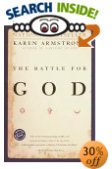
The Battle for God by Karen Armstrong
"An impressive achievement. Armstrong has mastered a mountain of material, added some brilliant insights of her own, and made it accessible to the general reader."
-- Rabbi Harold Kushner, author of When Bad Things Happen to Good People and How Good Do We Have to Be?--This text refers to the Hardcover edition.
From the Inside Flap
In our supposedly secular age governed by reason and technology, fundamentalism has emerged as an overwhelming force in every major world religion. Why? This is the fascinating, disturbing question that bestselling author Karen Armstrong addresses in her brilliant new book The Battle for God. Writing with the broad perspective and deep understanding of human spirituality that won huge audiences for A History of God, Armstrong illuminates the spread of militant piety as a phenomenon peculiar to our moment in history.
Contrary to popular belief, fundamentalism is not a throwback to some ancient form of religion but rather a response to the spiritual crisis of the modern world. As Armstrong argues, the collapse of a piety rooted in myth and cult during the Renaissance forced people of faith to grasp for new ways of being religious--and fundamentalism was born. Armstrong focuses here on three fundamentalist movements: Protestant fundamentalism in America, Jewish fundamentalism in Israel, and Islamic fundamentalism in Egypt and Iran--exploring how each has developed its own unique way of combating the assaults of modernity.
|
Book Description |
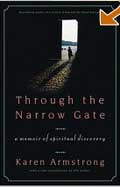
Through the Narrow Gate : A Memoir of Spiritual Discovery (Paperback)
by Karen Armstrong
Through the Narrow Gate is Karen Armstrong's intimate memoir of life inside a Catholic convent. With refreshing honesty and clarity, the book takes readers on a revelatory adventure that begins with Armstrong's decision in the course of her spiritual training offers a fascinating view into a shrouded religious life, and a vivid, moving account of the spiritual coming age of one of our most loved and respected interpreters of religious.
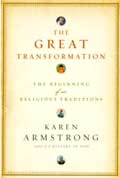
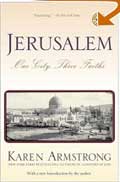 Jerusalem : One City, Three Faiths (Paperback)
Jerusalem : One City, Three Faiths (Paperback) 